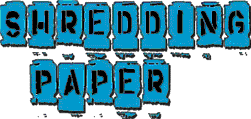

SP: Any particular kind of painting?
PH: Well I do portraits, mostly.
SP: And how about the other people who started the group, what were they into in art school?
PH: Well one of them, the drummer, had been to art school and the guitar player was from Orange County and just a regular guy and our bass player, Jimmy, he was always kind of a street musician type. He didn't go to art school.
SP: So who were the original members? How many in the group?
PH: There was four with me, Danny Furious on drums, Greg Ingraham on guitar, and Jimmy... Jimmy... James Calvin Wilsey on bass.
SP: Cause I remember back in those days I used to hear that Jonathan Postal, who became the lead singer for the Readymades, had been in the Avengers.
PH: Oh well that is actually a complete lie. No that's true. He was in the Avengers for about a month. And then...
SP: So there were 5 in the band?
PH: No, no, he was the bass player. He was replaced by Jimmy because we didn't have the same musical tastes.
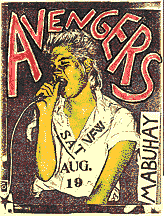
SP: So did you do the vocals?
PH: Yeah, I did all the vocals. I wrote most of the lyrics and that was one of the problems with Jonathan, he had some lyrics that he wanted me to sing but I could not bring myself (laughing) to sing them so we sorta went our separate ways.
SP: Yeah, two different bands from that era that were both real popular although I thing the Avengers are much better remembered today.
PH: I guess you could say that.
SP: So what was the first gig for the band after you got together and started practicing? How'd you get onstage?
PH: Well, the first time we played was at a warehouse party and there was about 200 people there. We just played covers. And then suddenly we got a show after the Nuns. The Nuns had just opened for Bryan Ferry or something and they were having a party afterwards and they said, "Why don't you guys play?" We didn't have any songs so, within a weeks time we wrote about six originals and we didn't have a rehearsal space so we had to just practice them acoustically and then we got up on stage (laugh) and played live... and it sounded so different. I didn't know what was going on. It was funny, because the second song I just thought, "I don't know what song this is. I can't remember the words." I thought I'd gone blank. And then it turned out that the guitar player was playing one song. They'd written their set list differently and we had to stop in the middle of the song. It was really confusing but...
SP: And what was the date there?
PH: Oh... probably April '77 at the Mabuhay.
SP: And after that you just kept doing more shows and...
PH: Yeah, it was funny because we were just complete trash at the beginning but it was so new that people just liked it anyways. We had instant acceptance.
SP: Why did the people in the band, I mean, why at that particular time, cause a lot was happening in 77, what was it that motivated people? "Hey lets start our own band." Cause everybody started to do it at that time.
PH: I don't know. There was a sense of freedom about it. People were fed up with the regular kind of music that was going on then and there was a freedom, you felt like you could do anything and be sorta accepted there was no hard and fast rule so....we took advantage of it.
SP: And also, of course, there was a club that would book the bands.
PH: Yeah, yeah.
SP: What were some of the bands you used to play with a lot in those days?
PH: Oh, well the Sleepers; from L.A. we used to play with X, but the Dils we played with them a lot, the Zeros, Alley Cats.... a local band from around here called the Liars. And well that was really early and then there was Crime and the Nuns too.
SP: Yeah, those were really great bands. I mean you're naming an awful lot of good bands.
PH: Yeah.
SP: We don't have a local scene like that nowadays.
PH: Seems to have changed quite a bit. Back then it was... people didn't fall into groups. People didn't even use the word punk rock that much and the bands that were around from England were quite diverse too; the Damned, the Clash and the Sex Pistols, for instance, are three completely different sorta sounds.
SP: Well I remember seeing you in those days and thinking that you seemed to be influenced a lot by British bands.
PH: Yeah (laugh), people have said that and people still do, the Sex Pistols especially. But it wasn't really intentional. Our guitar player had a similar guitar style. I guess that was why.
SP: Another thing that sort of set the Avengers apart from other bands was that you seemed to take yourselves real seriously. I remember when I used to see the band I would think, "Boy all the songs are real intense and political." It just seems like you took yourselves real seriously. You had that image.
PH: There's one of our better know songs "We are the World" ..no .. "We are the One" it was written really tongue and cheek. It was quite a joke. You know it's like... our anthem song and people used to sing along to it quite seriously but really it was written as a bit of a joke.
SP: And of course that was a single which is now a valuable collector's item.
PH: Yeah, I think that everything we put out when we were together is a valued collector's item because all the record companies...
SP: Well that's it isn't it?
PH: ... went under. (laugh)
SP: Was there anything else you put out besides the single when you were together?
PH: No, that's right. The other one came out after we broke up.
SP: How many of the singles exist?
PH: Oh, I really couldn't tell you.
SP: I've generally heard that it's about 1000 on black vinyl and about 4 or 5000 on red vinyl.
PH: I'm sure we only got paid for about 2000 so (laugh)... if they're around, I don't know.
SP: Do you remember the story about the vinyl because everybody in those days was putting out colored vinyl.
PH: Well this was an accident. Dangerhouse, they went in and the company had run out of black vinyl and they said "Well we have to have these pressed." and they said "Well, you can have it on red vinyl." So there it was.
SP: And now the question is which one is the more collectable one, the red or the black vinyl. What year did that record come out?
PH: I think on the record it says October 1977, can't remember exactly.
SP: And it was recorded in Los Angeles?
PH: Yeah... Kitchen Sink Studios. We did 4 songs in 10 hours or something like that.
SP: Three of which appear on the single; "Car Crash", "We Are the One" and "I Believe in Me".
PH: Yeah, 3 songs in 10 hours.
SP: Oh, so you didn't have a fourth song there.
PH: No, I don't know. My memory's.... getting.... warped here.
SP: That was your first time in the studio?
PH: Yeah, it was really terrifying. When we did "Car Crash", oh no... When we did "I Believe in Me" I just, we just did a test vocal to record the tracks along with and when it came to do the vocal I just said to leave that one on. I was too nervous to go in and do it. And it was so sorta spur of the moment as you can tell if you play that one it's a... everything was made up in the top of my head.
SP: Which is one of the reasons that sounds so great.
PH: Yeah, I guess I didn't think I could repeat it, so I didn't. That was pretty terrifying, our first time in the studio.
SP: How did you come about to get that deal to make that recording in L.A.?
PH: Well Dangerhouse was run by a bunch of guys and some of them were friends of mine and they were just a...
SP: Who were the people who ran Dangerhouse? They probably put out more independent stuff than any other label.
PH: It was K.K. who was in the Screamers and David Braun who was in the Screamers once playing synthesizer, there was Black Randy, famous on his own and um...oh Bob Dead, and Pat Randall, uh.... Rand McNally.
SP: And he produced the record or something?
PH: Oh all of them were there. They were all singing on the chorus of "We Are the One" I think it was. It was pretty funny.
SP: Who was engineering it? Did they...
PH: No, there was a guy there. He came with the studio. He actually did his own mix of "Car Crash" that had police sirens in the background. I'll never forget that. Of course, we didn't put that out but I'm sure it's around somewhere.
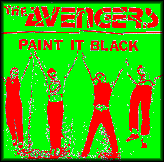
SP: When you went down to L.A., cause I've gotta tape here of "We Are the One" recorded I think in seven... I don 't even remember the date that it was recorded but the tape somebody gave me and they were at the show and they made a recording with their own little cassette deck. Did you used to go down to L.A. frequently to play? Cause this was, I think at the Whiskey, this show.
PH: Yeah we played L.A. a lot of times. People in L.A., they had this thing against bands from San Francisco.
SP: And visa versa if I remember correctly.
PH: Oh I don't know about.
SP: Well, the bands in San Francisco , at least, I mean, everybody up here sorta felt like, "Gee, too bad for L.A. We have such a much better scene" I know that.
PH: Think so?
SP: Yeah, oh yeah.
PH: I always appreciated the bands that came up. But anyway, when we played there, they said, "Well two of them come from Orange County so they're really not from San Francisco."
SP: Did you go down there often? Did you get good crowds and good responses when you played?
PH: Well yeah, we were quite popular in Los Angeles. Probably as popular as we were here.
SP: Did you go down there with other local bands or did you play with bands down there?
PH: No, we always played with bands down there. We did like to bring a lot of L.A. bands up. We brought X up and we brought the Alley Cats up, and oddly enough people really liked the Alley Cats and they didn't like X.
SP: It's interesting that all those, I shouldn't say all, but the Alley Cats are still together. They changed their name to the Zarcons but it's the same 3 people.
PH: Oh, I didn't know that.
SP: And X is obviously still together. They've got a new album. A lot of the L.A. bands seem to have done well over a long period of time. On the other hand on the San Francisco scene, the Mutants are gone. They played their last show.
PH: But the Nuns are back together.
SP: Well sporadically I guess. They played a comeback show. Is there any chance that the Avengers will get back together and do a show like that?
PH: No, no, I don't think so. We've all gone our separate ways and the thing is that people... even doing separate things... people still expect the same stuff from you. We're all completely different musically now, I'd say. Jimmy's playing with Chris Isaac now. He's been playing around a lot. He's playing guitar and he's developed quite a different style from the Avengers. And my style now is completely different. So if we got together, people would just expect the same stuff.
SP: What kind of music are you playing now?
PH: Well I guess I'd guess I'd call it kinda folkadelic or something. (all laughing) It's hard to describe.
SP: You have a band or anything?
PH: I'm working on a band. Still looking for the last right person.
SP: Well that will be interesting to hear. Probably not too much longer.
PH: Um... yeah. I don't want to make any promises, but soon.
SP: Does your music fit in with any of the contemporary music that's been coming out? Or is it kind of different. Would it be played on this station?
PH: Yeah. Yeah. It's listenable. (laugh) I don't think it fits directly into any groove. It's not real sixties or real folk, it's kind of an odd mixture. It's not real psychedelic. It's not purist or anything. It's just ... a bizarre stew of sounds.
SP: And you're still writing all the lyrics? And how about the music now?
PH: I've written the music for a couple of songs. I'm actually working with other people on lyrics for the first time. It's good though cause it kinda makes for a different sound. Otherwise you get kinda homogenous.
SP: How do you feel when you hear the old stuff? Does it seem dated or can you still relate to it?
PH: I like it. I think a lot of the songs are good exciting songs. I still can cringe when I hear my voice cause on vinyl or even on tape sometimes it sounds really (imitating the sound) nasal and high. But that always happens. I like the Avengers music. I mean I don't sit around and listen to it when I'm at home making dinner or anything.
SP: Well, in those days, what kind of music were you listening to?
PH: Well we had a pretty wide selection of music to listen to. We listened to reggae, we listened to the Ronnettes, we listened to Gene Vincent and Hank Williams, a wide range of things plus all the stuff that was coming out.
SP: And you went to local shows by the bands you used to play with. Which were your favorites?
PH: My favorite San Francisco bands were the Sleepers and the Dils, if you can call them a San Francisco band, I guess they moved here later. And after we broke up there were people we used to go see; Pink Section, it's all I can think of off the top of my head.
SP: Any comments on "Chorpus Christi"?
PH: People didn't always understand that. They thought I had gone religious. I didn't.
SP: That's one of my favorites. In fact that whole 12 inch. What label did that come out on?
PH: It was called White Noise.
SP: That was after you broke up.
PH: Yeah.
SP: Who were the people that put that out?
PH: Um... gosh. I couldn't tell you. They only put out one other record and that was Richard Meltzer.
SP: Cause I remember that the 12 inch was out of print for a while and then it came back in print for a while.
PH: Everything that ever got put out by us... Everytime they printed it it was different. There was a different colored cover for that one.
SP: It's a good record. Who produced it?
PH: Well Steve Jones. We originally recorded it with Steve Jones but we remixed it with a guy named Renee Dalder and the Avengers.
SP: When you say Steve Jones, you mean from the Sex Pistols?
PH: Yeah.
SP: That Steve Jones. The famous Steve Jones. What was it like working with a Sex Pistol.
PH: Well he had his idea of guitar sounds down pat. I didn't really like what he did with my vocals. I recorded all my vocals.
SP: Hmmm, what did he do with your vocals.
PH: I don't know, he just wasn't particularly interested in them. The song we mentioned, he didn't work on that, it was a 4 track that we recorded out around here somewhere in Richmond somewhere. In someone's garage. We took it to a 16 track and beefed it up a bit. He didn't have anything to do with that one.
SP: So which were the ones that he produced for you?
PH: "White Nigger", "The American in Me", and "Uh Oh".
SP: How about "1,2,3" ?
PH: And "1,2,3".
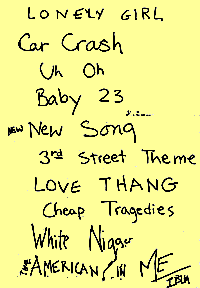
SP: And that one never came out until the album but he put out his version as the Professionals. Was that a song that he had written?
PH: Yeah, he wrote the music to that and we all sorta got together to write the lyrics. But I rerecorded it as "Girls" with Rene Dalder another time but that's never come out. So on that album that's the Steve Jones mix. There's a few Steve Jones mixes on the album. On the CD album.
SP: Cause I remember I used to see you perform that song live. It was like my favorite song live. And there were other songs that you performed live that never surfaced anywhere.
PH: Yeah, there were. There were. In fact somebody gave me a tape of a show we did live and said, "There's some blanks here. I don't know the titles of these songs. Can you fill them in?" And two of them, I couldn't figure out what they were. I couldn't recognize the songs.
SP: You wrote them though, probably.
PH: Yeah, I guess so. I don't know what they were but they never stuck around, I guess.
SP: What's happened in the last seven years? What have you been doing? You haven't been in a group until your new one.
PH: Oh so much stuff has happened. I was working with the same person, Rene Dalder on some films and some video and some recording with Tomata from the Screamers in Los Angeles until about '82. Then I moved to England and I did one recording with Howard Devoto. I tried to get a band together in England, but I think we have different sensibilities. And I really did want sort of an American sound so I came back recently and started on a group here.
SP: What happend with the recording you made with Howard Devoto?
PH: It's... it's on record. It's on "Jerky Versions of the Dream" his solo album which came out about two years ago.
SP: What was the song called?
PH: It's called "Taking Over Heaven" and I'm singing. He said "Let's do a duet" but by the time it finished being mixed I was mostly on the studio floor. So it's semi duet, semi backing vocals.
SP: So then after England you came back here.
PH: Yeah. Yeah. I came here actually just to visit and and travel around the country and I ran into Greg from the Avengers and he had all these great songs. I decided I'd work on them then I decided I'd record and then I decided to have a band and before you know it - stuck. Stuck back here in San Francisco.
SP: Well after you came back they put out that album on CD (label name).
PH: Well actually that came out when I was in England.
SP: Oh really? Cause I remember when they put it out they said there was gonna be a signing and members of the group were going to be at a record store to sign the record so I assumed that you were back. But I guess...
PH: No actually I didn't know about the record when it came out. I didn't know. I knew before I left for England. I sent some tapes to Danny. He said he wanted to put the record out. But nobody told me it was coming out on CD Records. Nobody told me that it was out. People kept saying, "Oh there's a record" "Oh there's a single" "Oh there's a cassette" "Oh there's a songbook" "Oh there's a poster". It was like every month somebody would say they saw this new item of merchandise and CD was not anywhere to be found. They were not answering any letters or phone calls or anything, so when I came to town I looked them up and took care of that business.
SP: Which what did that mean exactly?
PH: Well, you know, I just went in there with a gun and said "Look" (laugh) No, no, not really. I just said, "Well the record's out and I guess you should give me some money."
SP: So did you get money from all those records?
PH: Yeah. I did. But there were a couple of things about it I didn't really like.
SP: Like what?
PH: Well, they put two songs on there that we recorded in a studio and I thought they were pretty flat; "Desperation" and "No Martyr". I like the songs themselves but they weren't very good versions of the songs.
SP: When you recorded the songs in the studio originally, who was going to put them out?
PH: They were just going to be a demo tape. We did that down at Wally Heider. This guy said come in and do it, this engineer. We were supposed to buy the tape from him, so they re-recorded over their master tape and we just had a reel to reel of it that was floating around. But they were never gonna be put out.
SP: What was the demo for? In those days did you think that you could get signed to an American record company?
PH: Yeah, I guess in the back of your mind. You just go to do a demo, just to record. Because nobody was saying "Hey, go in and record", so if somebody offered you studio time, you just took it.
SP: Did you ever hear the KALX live tape that we recorded of you guys at the Old Waldorf toward the end of your career?
PH: No I never heard that. That was our last show ever.
SP: No it wasn't. I think it was supposed to be but then a couple of weeks later you played one more or two more shows.
PH: Was it with Penetration?
SP: Yeah.
PH: That was our last show. After we decided to break up we had three shows scheduled; one was at the Temple Beautiful on Geary Street, we booked that as our last show and then we played a couple of days later at the Mabuhay and said "Well this is our last show", but actually our last show was opening for Penetration (at the Old Waldorf) but it wasn't as much our audience as the other shows had been.
SP: How did you like Penetration that night? Were you a fan of that band or anything?
PH: I hadn't really heard much of what they'd done. I thought they were okay. They didn't win me over as a huge fan or anything.
SP: Really... Well we're gonna play something on the tape from that night. You'll hear one song from the band's final show. (song is played) "Cheap Tragedies" Tell us something about it. Did you write that song?
PH: Yeah, I wrote the lyrics to that one.
SP: Who wrote the music?
PH: Greg. Greg wrote the music to it, yeah. He wrote most of the music and I wrote most of the lyrics.
SP: He wasn't with the band the whole time, right?
PH: No, he kinda quit after we recorded that. And then we had Brad Kent from Canada play guitar with us for a long time.
SP: Why did Greg quit?
PH: I guess he felt that there were too many pressures in the band and he just didn't want to do it anymore. I really can't figure it out. No I just saw Greg a couple of hours ago. He comes by every now and then and he's been writing some really nice stuff. Sort of a Western sounding guitar stuff.
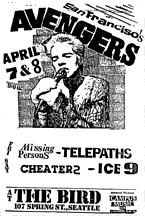
SP: And Randy Rampage also recorded that song, "Cheap Tragedies".
PH: Oh yeah, that was frightening. Hearing a man singing my lyrics it was like "Whoa!", I don't know, it was very strange.
SP: You didn't feel comfortable with his version?
PH: Well, I guess it's an okay rock'n'roll sort of version but, I don't know, I think it takes a long time for people to do better versions than the originals.
SP: We were just looking at some picture and one was of the Sex Pistols last gig which was what, January 14, 1979 or something?
PH: 1978.
SP: '78... wow! And you were on the bill with the Sex Pistols at Winterland with 5,000 people. What was that like?
PH: Well that was really.... I was... I was... terrified. (laugh) It was really funny. We played with the Nuns who, up until then, had been a bigger band than us. And we started to get our own audience. But the guy who was the road manager for the Sex Pistols had seen us and he asked us to play. And the Nuns said, "If you guys want to open for us, we'll understand." I said, "You gotta be kidding, " cause we played between the Nuns and the Sex Pistols. The stage was already soaked with spit by the time we got up there and the audience was maybe a third punk fans and the rest just wanted to see this phenomenon, the Sex Pistols... and they were quite hostile actually. I was pretty terrified. They were all being crushed also.
SP: I notice that. I was nowhere near the stage. It was just like a human wave. Everyone was moving together. It was packed in so tight, it was kinda scary.
PH: During the Sex Pistols set, I got within 10 feet of the stage and I was completely crushed and soaked. It was, you know, a hundred and ten degrees right there. It was crazy. It was really an exciting show.
SP: It was their last show and it was the biggest crowd they had ever played for, bigger than even in England.
PH: Also the biggest crowd we had ever played for.
SP: Yeah big difference playing for 500 people at the Mab and 5000 people at Winterland.
PH: Yeah, it was really quite terrifying.
SP: Is that where you met Steve Jones who later produced your stuff?
PH: Yeah we kind met him through this guy Rory who was this English guy who road managed them and he was a friend of Malcom McClaren and he wanted to manage us and he did manage us for a while and he was the one who brought Steve Jones over to mix our songs. That turned into a fiasco. Steve Jones had to go back to England right in the middle of working with us. Actually no, we finished working and the tapes were still in the studio. They weren't paid for and Steve Jones went back to England and started suing McClaren. Him and Paul Cook were suing McClaren. Oh they were always having turmoils, the Sex Pistols. Anyway they left the tapes in the studio and we didn't have any way of getting them out. It was a big hassle. A legal thing.
SP: What was it like being backstage that night with the Sex Pistols?
PH: They were nowhere to be seen and there must have been a hundred photographers and journalists all just waiting for some kind of punk action. A bunch of our friends were back there. They had this huge spread for the Sex Pistols. Lots of beer and popcorn and all the beer and popcorn ended up on the floor which made it really slippery. They were all kind of sliding around. There was a line of photographers, at least 12 photographers, all lined up just going "tchk tchk tchk tcht" and so we started jumping around there's always these pictures of backstage at the Sex Pistols concert but it was kinda brought on by photographers hysteria.
SP: Well I guess that will explain a lot of pictures, huh?
PH: Yeah I always see them. We were making these outrageous faces. We were just hamming it up for the cameras, I guess.
SP: Was that a real nostalgic time to you? Do you think back like that was the good old days when you had the punk scene going here?
PH: Well there was a feeling I think that was really good about it. I don't personally, in my life, it wasn't the most wonderful times, but as far as the scene... feeling that there was a real scene, I knew everybody that was in it and it had this great free feeling about it and things were sorta happening and it was exciting. It was great.
SP: And the music that came out of it was remarkable. It's hard to believe it was ever that good around here, and it was. Cause there's nothing comparable today and there hasn't been for years.
PH: Well, you had to be there, I guess.
SP: What do you think of the contemporary punk scene, the hardcore scene?
PH: I'm not a big fan of thrash music. I think a lot of people take it more seriously than we took ourselves. If you don't have a sense of humor about yourself, I don't know how you can be an artist and get up in front of people.
